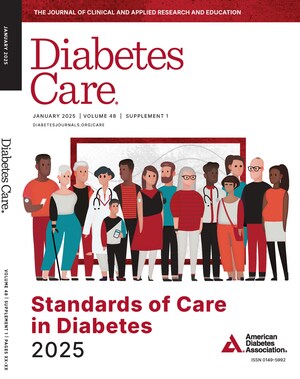ARLINGTON, Va., Aug. 9, 2018 /PRNewswire/ -- Type 1 diabetes (T1D) is a complex and challenging disease, especially for youth and adolescents due to the biological and physical developmental stages from childhood to adulthood. To address the specific needs of youth and adolescents, the American Diabetes Association issued "Type 1 Diabetes in Children and Adolescents: A Position Statement by the American Diabetes Association" today, which is available online and will be published in the September 2018 print issue of Diabetes Care.
A team of eight pediatric diabetes authorities from leading institutions and diabetes care centers across the United States convened to create the position statement, which is comprised of recommendations and guidelines based on the body of evidence from over 190 pieces of literature, including research studies and consensus reports. The panel noted that while adult clinical trials in T1D have produced fairly robust evidence which have advanced care and improved outcomes, large, randomized pediatric clinical trials are challenging to recruit for and complete. Thus, this is the first updated ADA pediatric T1D position statement since 2005 and the majority of recommendations for youth with T1D rely on supportive evidence from cohort/registry studies or expert consensus and clinical experience.
The statement contains guidelines on T1D staging, screenings and T1D diagnosis, including the importance of distinguishing between type 1 diabetes, type 2 diabetes, monogenic diabetes and other forms of diabetes. Specific information is provided on blood glucose management, lower blood glucose and HbA1c targets with details outlining self-blood glucose monitoring, the increasing use of continuous glucose monitoring and novel automated insulin delivery systems. The authors note that there are improved outcomes for patients when there is adequate payor reimbursement for the numerous supplies and devices needed to optimize T1D management, especially in the pediatric population.
Proper lifestyle management (nutrition, exercise) for youth with T1D is also emphasized, as well as complications of T1D and the behavioral aspects of self-management that clinicians should be familiar with, including potential depression, anxiety and eating disorders. The statement also addresses the specific needs of adolescent patients and the challenges that arise within this age group, including making the transition to self-care and the dangers of high-risk behavior among adolescent patients. The statement stresses that providers should encourage developmentally appropriate family involvement in diabetes management tasks for children and adolescents and cite that premature transfer of diabetes care from the pediatric to the adult care setting may result in poor self-management behaviors and deterioration in glycemic control.
"It is critical for us to remember that children are not little adults, thus, pediatric-onset diabetes is different from adult-onset diabetes due to its distinct epidemiology, pathophysiology, developmental considerations and response to therapy," said senior author Desmond Schatz, MD, Professor of Pediatrics and Medical Director of the Diabetes Center, and Director of the Clinical Research Center within the Clinical and Translational Science Institute at the University of Florida, Gainesville, and the ADA's 2016 President of Science and Medicine. "Clinicians must be mindful of a child's current and evolving developmental stages and must adapt care plans, particularly during the adolescent years, in order to maximize glycemic control and appropriately support the needs of both the patient and their family."
The availability of ever-improving technology devices to assist in diabetes care is credited with providing advances in T1D research, treatment and management, however, the authors cite the need for more studies in the pediatric population to address and support the unique characteristics of T1D during each developmental stage from youth and adolescence to adulthood.
"While we are still uncovering the complex markers and potential triggers for type 1 diabetes in youth, these guidelines represent our commitment to personalized care to meet the unique needs of each individual living with diabetes," said ADA's Chief Scientific, Medical and Mission Officer William T. Cefalu, MD. "We also encourage rapid diagnosis and treatment, and whole-family care, given the 24/7 burdens of diabetes management in children, in the hopes of yielding improved short- and long-term health outcomes and quality of life."
Any future updates to pediatric care will be published in the ADA's annual Standards of Medical Care in Diabetes.
About Diabetes Care®
Diabetes Care is a monthly journal of the American Diabetes Association dedicated to increasing knowledge, stimulating research, and promoting better health care for people with diabetes. To achieve these goals, the journal publishes original articles on human studies in the following categories: clinical care, education and nutrition; epidemiology, health services; and psychosocial research; emerging treatments and technologies; and pathophysiology and complications. The journal also publishes the Association's recommendations and statements, clinically relevant review articles, editorials and commentaries. Topics covered are of interest to clinically oriented physicians, researchers, epidemiologists, psychologists, diabetes educators and other health professionals. Diabetes Care is the highest-ranked, peer-reviewed journal in the field of diabetes treatment and prevention.
About the American Diabetes Association
Nearly half of American adults have diabetes or prediabetes; more than 30 million adults and children have diabetes; and every 21 seconds, another individual is diagnosed with diabetes in the U.S. Founded in 1940, the American Diabetes Association (ADA) is the nation's leading voluntary health organization whose mission is to prevent and cure diabetes, and to improve the lives of all people affected by diabetes. The ADA drives discovery by funding research to treat, manage and prevent all types of diabetes, as well as to search for cures; raises voice to the urgency of the diabetes epidemic; and works to safeguard policies and programs that protect people with diabetes. In addition, the ADA supports people living with diabetes, those at risk of developing diabetes, and the health care professionals who serve them through information and programs that can improve health outcomes and quality of life. For more information, please call the ADA at 1-800-DIABETES (1-800-342-2383) or visit diabetes.org. Information from both of these sources is available in English and Spanish. Find us on Facebook (American Diabetes Association), Twitter (@AmDiabetesAssn) and Instagram (@AmDiabetesAssn).
Contact: Michelle Kirkwood, 703-299-2053
[email protected]
SOURCE American Diabetes Association
Related Links
WANT YOUR COMPANY'S NEWS FEATURED ON PRNEWSWIRE.COM?
Newsrooms &
Influencers
Digital Media
Outlets
Journalists
Opted In






Share this article